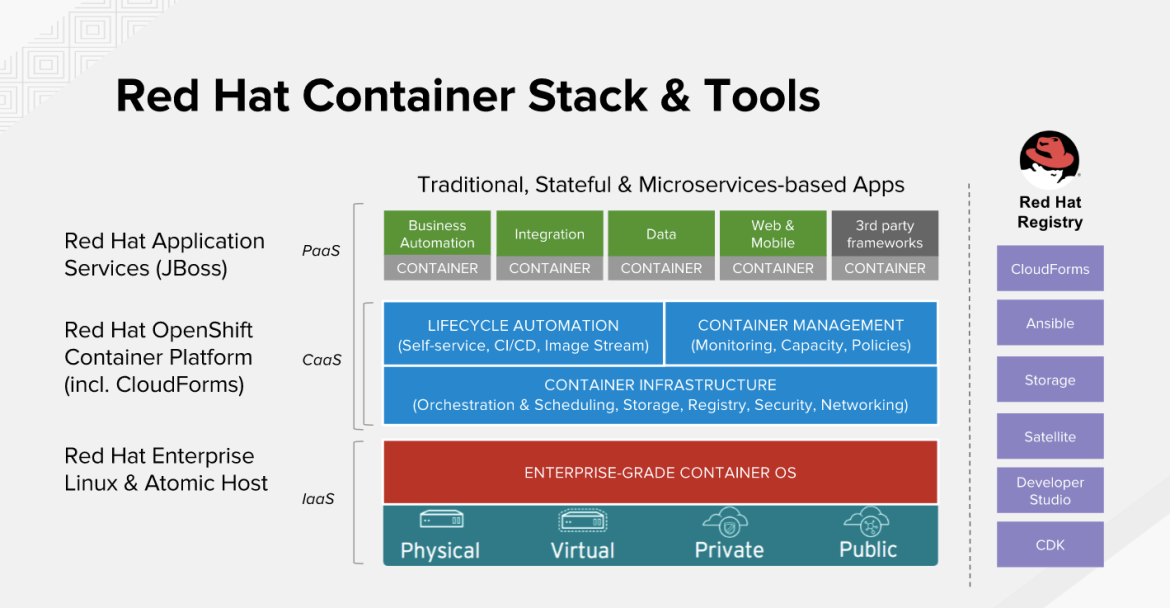Red Hat blog
At Red Hat Summit today we announced an expanded portfolio of container products and technologies to accelerate container adoption from development to production. Major customers around the world like BBVA or Royal Bank of Scotland as well as innovative startups and ISVs choose OpenShift to drive digital transformation, app modernization and DevOps initiatives with a Red Hat container platform at the core.
Today’s announcement builds on this momentum with new OpenShift offerings, container-native storage, CloudForms container management, JBoss application services, and OpenShift Primed which is a new designation for solutions developed by ISV partners.
One container platform
Since we launched OpenShift 3 about a year ago, we’ve learned from our customers that they want an enterprise-grade container platform that is consistent from a developer’s laptop all the way to production, and available in a variety of consumption models to help customers adopt a cloud strategy that works best for them.
The container platform should allow developers to focus on their code using their existing tools and familiar workflows including CI/CD. Developers shouldn’t have to worry about (or touch) a Dockerfile and simply right-click-deploy apps from their favorite IDE to any destination, including local laptops, to the data center and to the cloud. It’s all about ease of use and delivering a superior developer experience.
A consistent container platform is also important for Ops teams who want to manage both traditional and microservices-based apps at scale and in one place with complete visibility from the app-layer down to container, OS, virtualization and hardware layer. Ops teams also care about security, scalability, access control and policies which are important areas where we’ve made a lot of contributions to Kubernetes that now also ship in OpenShift 3.2.
With that in mind, we’re now offering OpenShift in three flavors:
- OpenShift Online: multi-tenant, cloud-based container platform, managed by Red Hat
- OpenShift Dedicated: single-tenant, cloud-based container platform, managed by Red Hat
- OpenShift Container Platform (formerly OpenShift Enterprise): the container platform software for customer to deploy and manage on their own in an infrastructure of choice.
OpenShift Container Platform is also available in two additional packages targeting developers and dev/test labs:
- OpenShift Container Local -- free download as part of the Red Hat Developer Program for developers who want to deploy OpenShift on their local laptops
- OpenShift Container Lab -- for dev/test and Ops teams who want to to deploy OpenShift for extended evaluation, POC and pre-production use cases.
OpenShift Enterprise is now OpenShift Container Platform
Why are we changing the name of OpenShift Enterprise and what does that mean for you? Customers increasingly deploy OpenShift on AWS or Azure, and OpenShift is also the platform that powers our next gen OpenShift Online service as well as OpenShift Dedicated. They’re exactly the same bits under the hood.
Red Hat ships enterprise software and the product name doesn’t necessarily need to say that again. We felt that “Container Platform” better communicates what OpenShift does regardless of where you deploy it -- on premise or in a public cloud. Nothing else changes and you can expect the same strong product roadmap and engineering investments, support and community engagement from us as before.
Pardon our dust
As with any name change, there will be a transition period. You’ll see the new OpenShift Container Platform name appear on our website and customer portal first. We’ll gradually update other content and the user interface in the product with our next release later in the year. Documentation for previous releases will continue to refer to the old product name.
What’s next?
We’re excited about the great adoption and value that customers get out of OpenShift, and we work hard to bring new features to market in an open source and community-oriented way. If you’re at Summit, check out the OpenShift roadmap and the Red Hat containers roadmap sessions. We’ll be recording these sessions and post the videos here after the event.
We encourage you to also try out our next-gen version OpenShift Online, and participate in a hackathon with more than $150,000 (!) in prizes and the opportunity to build apps to help promote healthy living.
Useful links:
- Sign up for a next-gen OpenShift Online account
- Browse OpenShift Primed partner solutions on OpenShift Hub
- Join OpenShift Commons, a community of users, partners and customers to share best practices and collaborate on OpenShift.
- Contribute to OpenShift Origin, Project Atomic, Kubernetes upstream projects.


